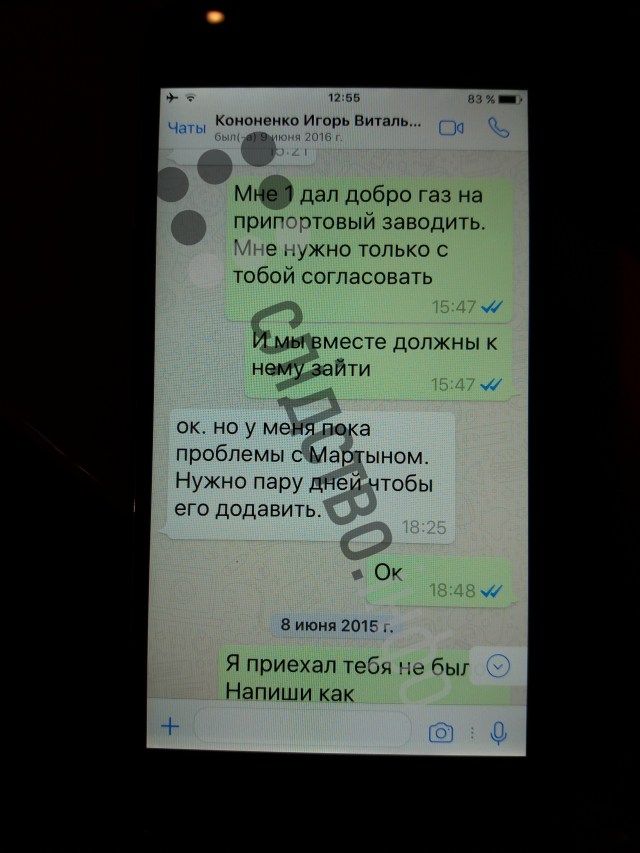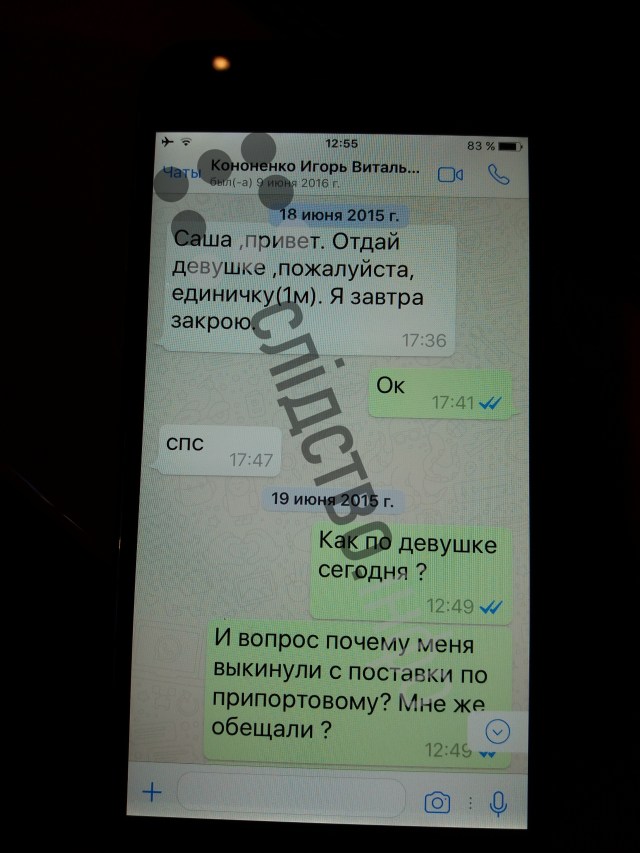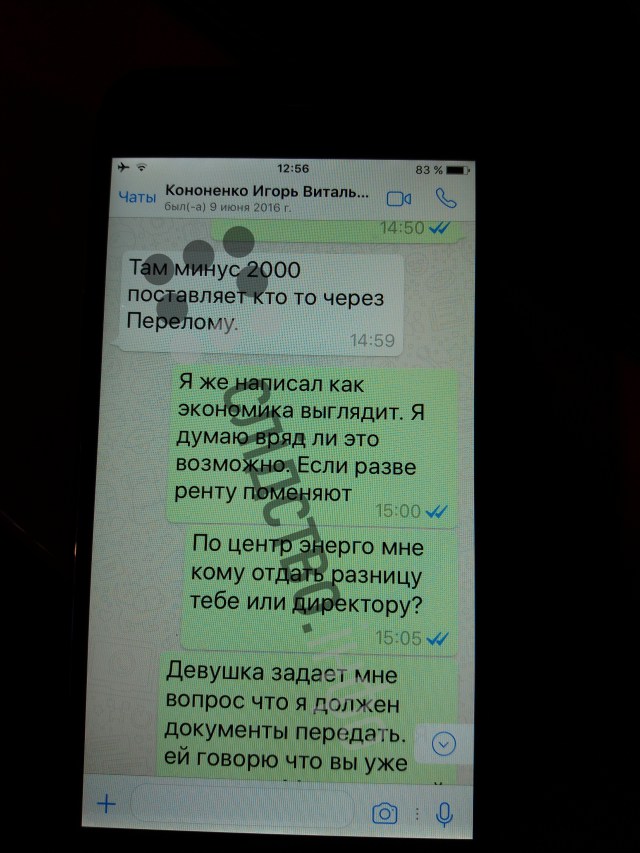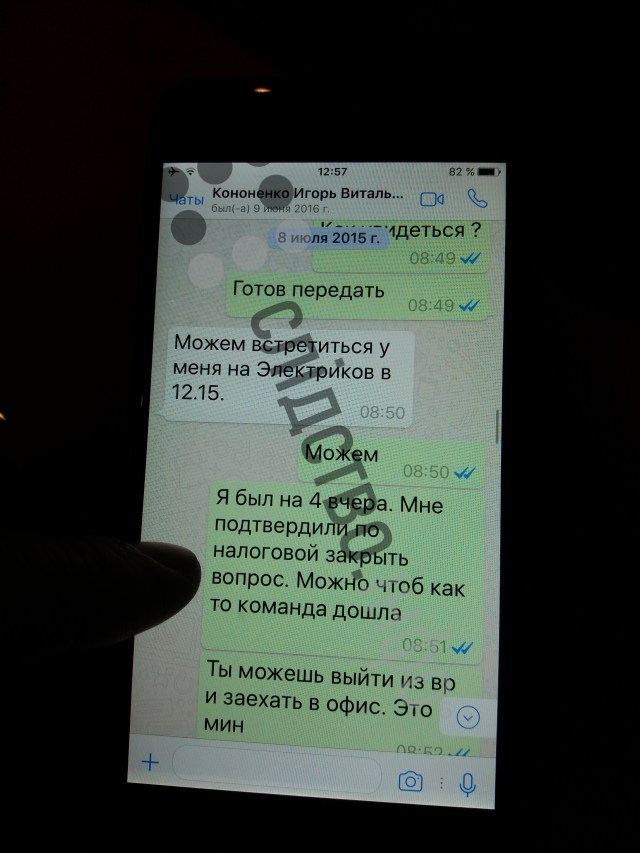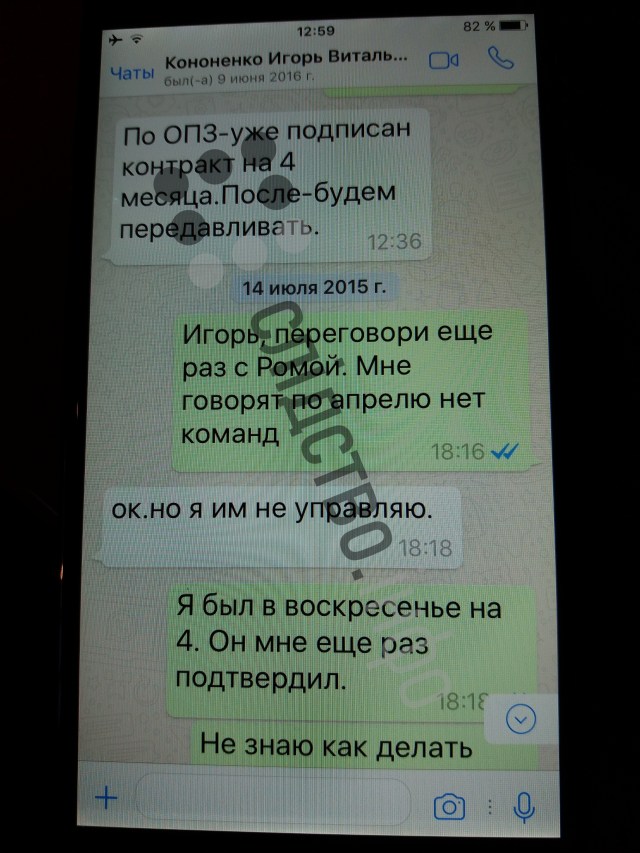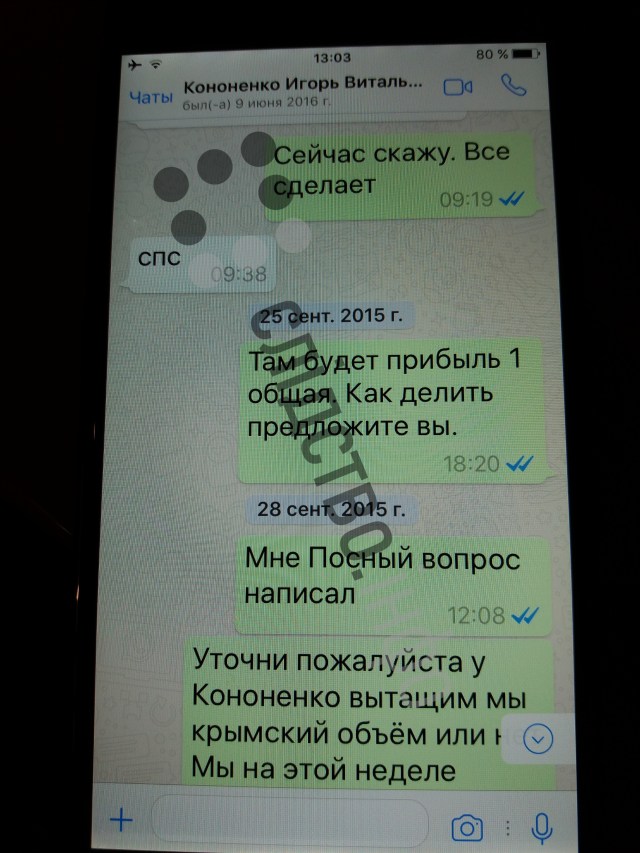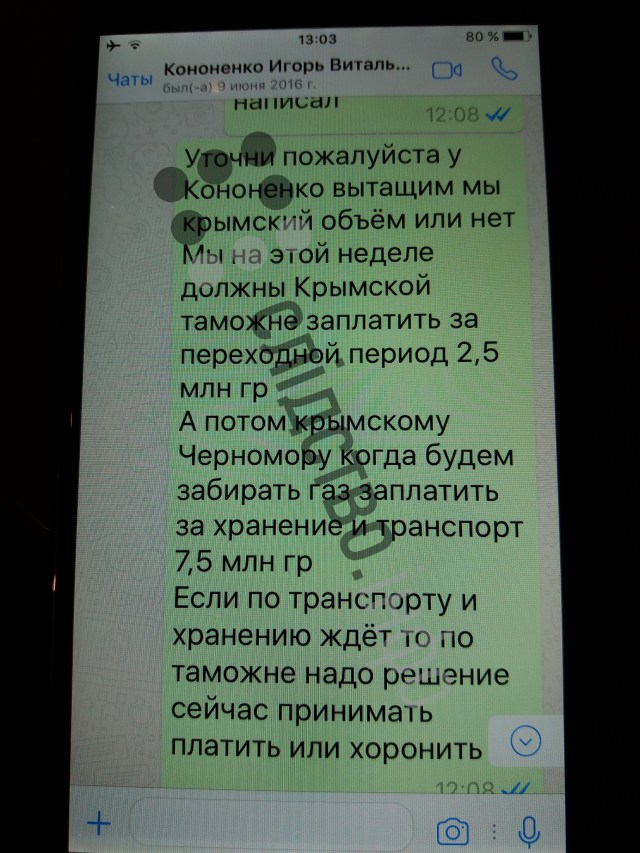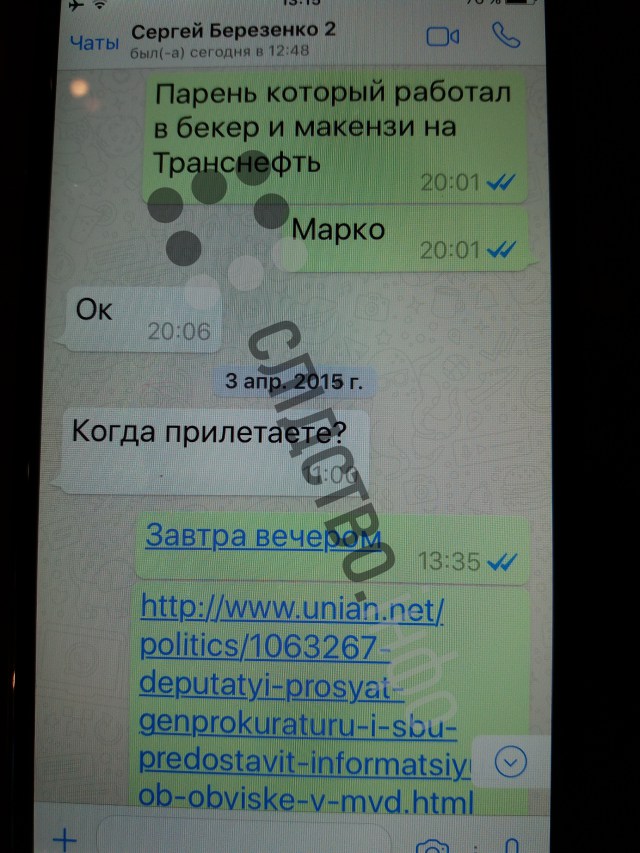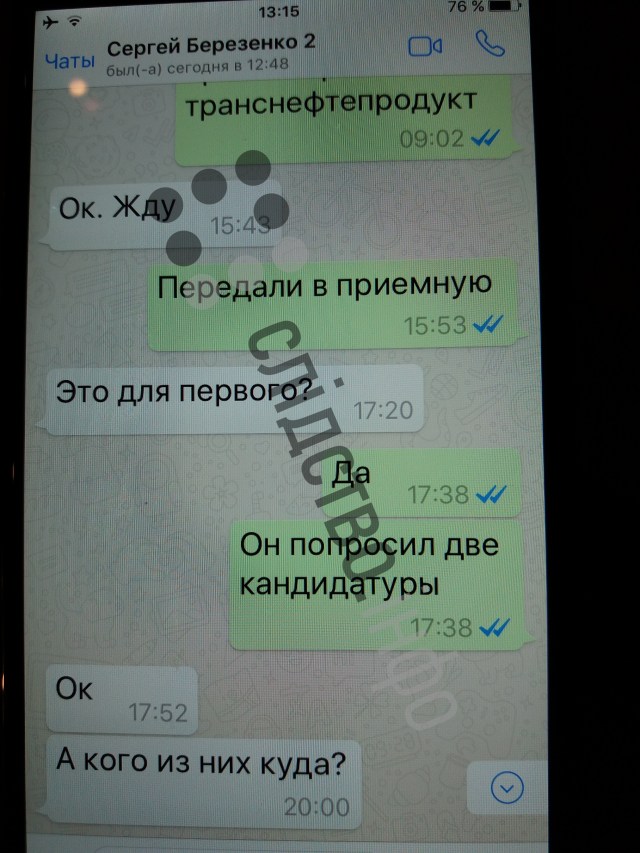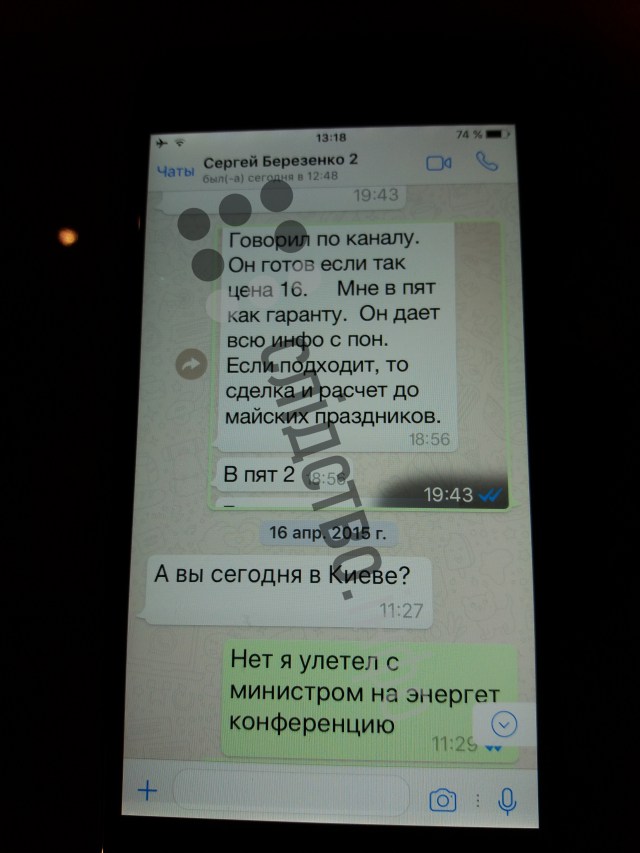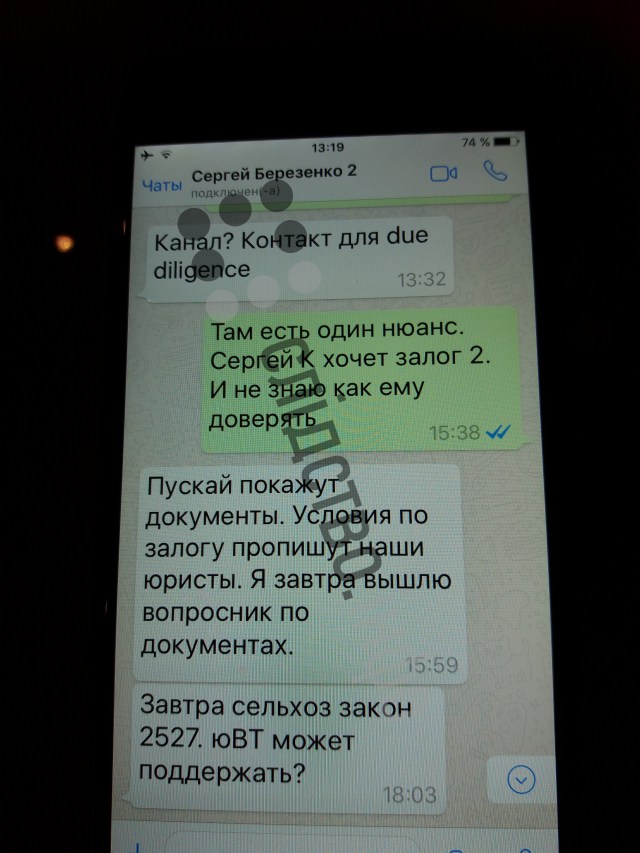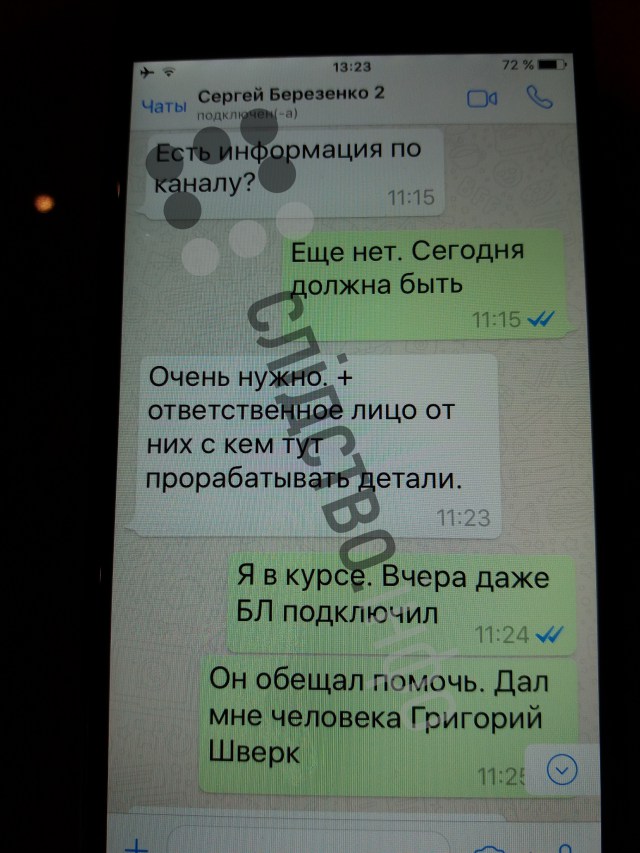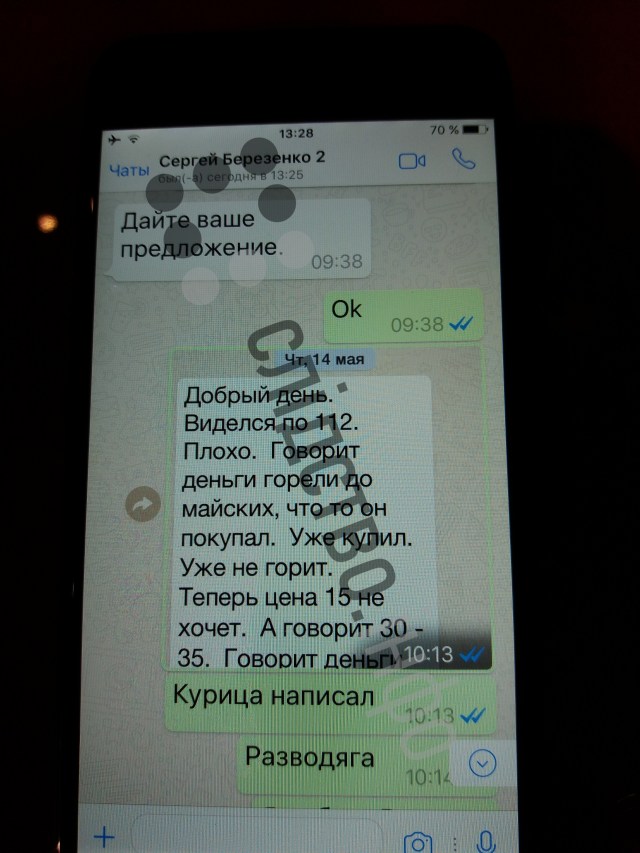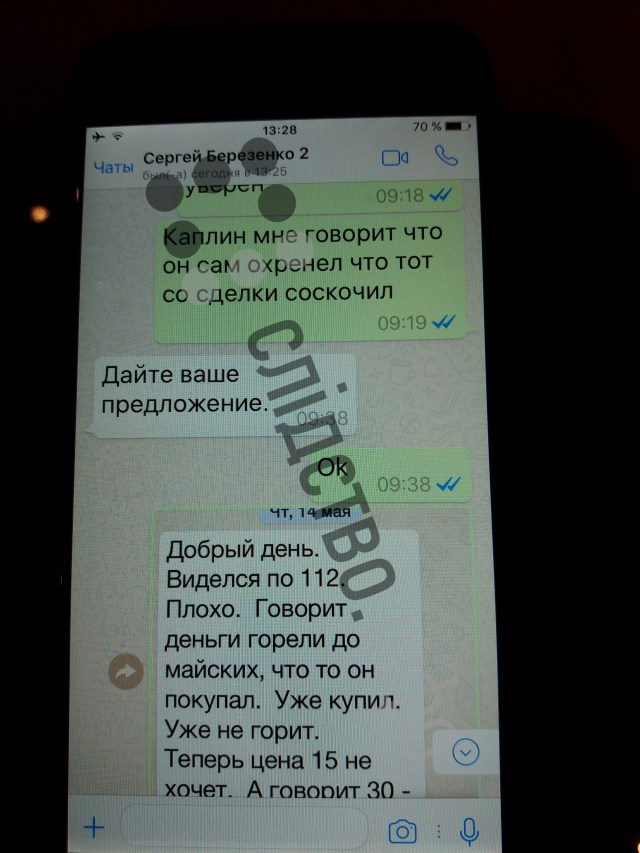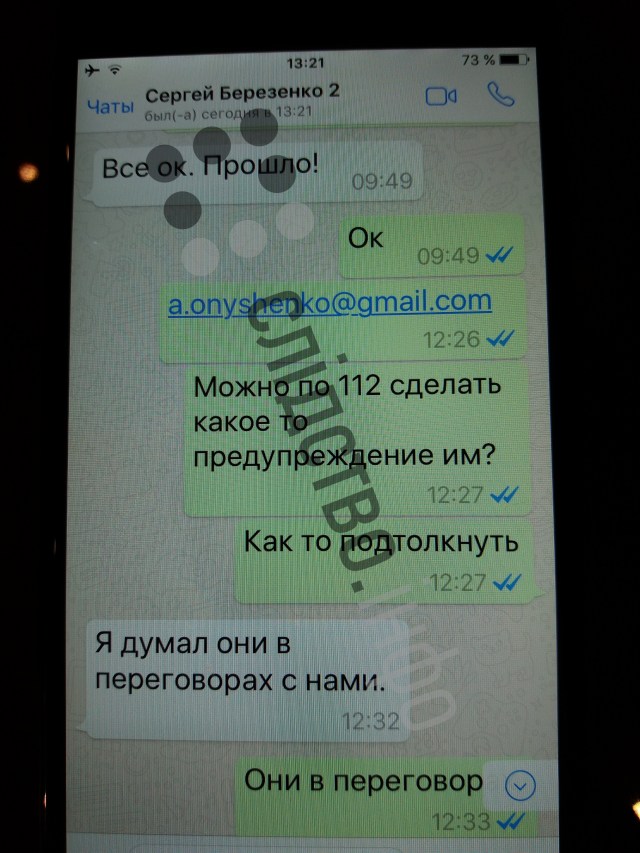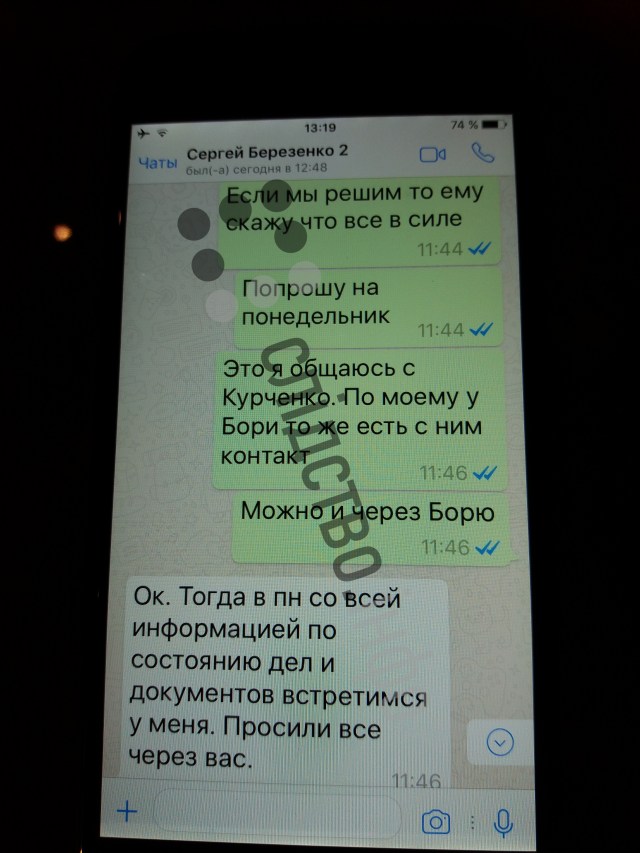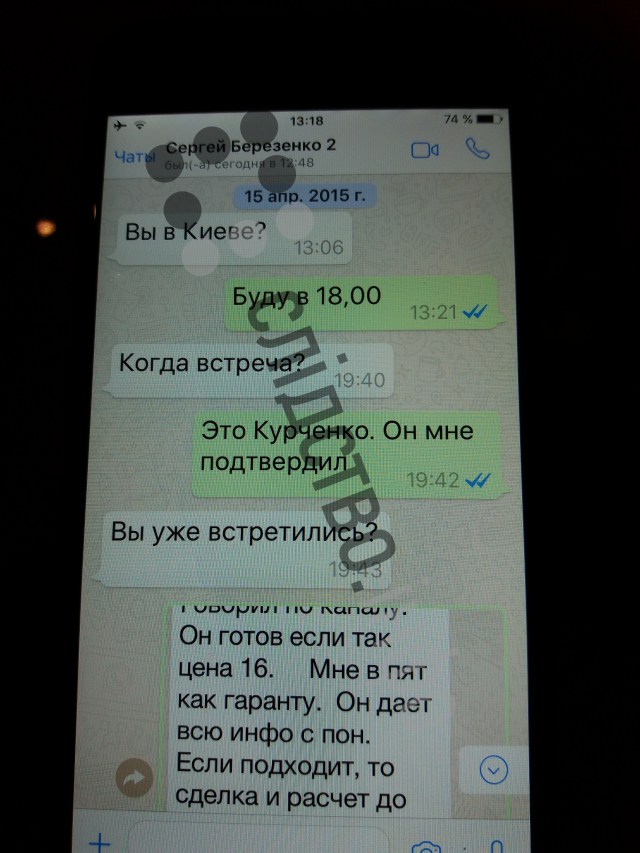See related stories here and here.
The Slidstvo.info investigative show on May 10 published about 350 alleged Whatsapp messages between fugitive lawmaker Oleksandr Onyshchenko and allies of President Petro Poroshenko.
The messages, if true, expose extensive corruption at the top. Poroshenko’s spokespeople have said Onyshchenko, fleeing corruption charges in Ukraine, is not credible.
However, Onyshchenko also published a book in April called “Peter the Fifth: A true story of a Ukrainian dictator,” in which he details his accusations against Poroshenko.
Besides Poroshenko’s denials, presidential allies Igor Kononenko, Serhiy Berezenko and Makar Paseniuk, as well as Batkivshchyna Party leader Yulia Tymoshenko, all of whom are mentioned in the alleged correspondence and the book, also deny wrongdoing.
Onyshchenko said on Facebook that he had been interviewed by Slidstvo.info journalist Dmytro Gnap but denied giving his phone to him and claimed that the Whatsapp correspondence had been “messed with” and “out of context.” Later he deleted the post.
Gnap told the Kyiv Post that Onyshchenko was lying to cover his change of mind. Gnap said that Onyshchenko had been angry with Tymoshenko and given the messages to Slidstvo.info, but later decided that he did not want them published because he wants to promote Tymoshenko’s interests.
In 2016 Onyshchenko sent some of the messages later published by Slidstvo.info to the Kyiv Post, saying they were authentic.
The National Anti-Corruption Bureau of Ukraine has charged Onyshchenko with stealing Hr 1.6 billion ($64 million) from state-owned gas producer Ukrgazvydobuvannya, which he denies.
He fled Ukraine before he was stripped of his parliamentary immunity in 2016.
Odesa scheme
Kononenko, the lawmaker considered to be Poroshenko’s right-hand man, has been accused of influencing numerous state firms and getting corrupt revenues from them, which he denies.
Onyshchenko told the Kyiv Post that he had been paying a Hr 2,000 bribe per 1,000 cubic meters to Kononenko to supply natural gas to a state-owned fertilizer producer, the Odesa Portside Plant.
The National Anti-Corruption Bureau of Ukraine is investigating Kononenko, his close associate and lawmaker Oleksandr Hranovsky, and ex-People’s Front lawmaker Mykola Martynenko in a graft case linked to gas supplies to the Odesa Portside Plant.
“The boss (Poroshenko) gave me the greenlight to supply gas to the (Odesa) Portside Plant,” Onyshchenko told Kononenko in May 2015.
Kononenko replied that he was “having a lot of problems with Martynenko, and a couple of days is needed to push him out.”
“Why have I been thrown out of gas supplies to the (Odesa) Portside Plant?” Onyshchenko asked Kononenko in June 2015. “You promised!”
Kononenko replied that he didn’t know and then started negotiating the price of gas supplies to the plant. Later Kononenko proposed that Onyshchenko pay the same price as Martynenko’s business partner Serhiy Pereloma, chairman of the Odesa Portside Plant’s board of directors.
Pereloma was charged with embezzling money from the Odessa Portside Plant through supply contracts and released on bail in 2016.
“The woman said she had reached a deal on gas supplies to the Odesa Portside Plant with you,” Onyshchenko asked Kononenko on July 13, 2015. “Is that the case?”
“A four-month contrast has already been signed for the Odesa Portside Plant,” Kononenko replied. “We’ll renegotiate later.”
Olga Tkachenko, an ex-aide to Hranovsky, used to be a member of the Odesa Portside Plant’s executive board, while Oleksandr Vizir, an aide to Kononenko, became a member of Odesa Portside Plant’s board of directors in 2016.
Tsentrenergo scheme
Onyshchenko also told the Kyiv Post that he had been paying a Hr 2,000 bribe per 1,000 cubic meters to Kononenko to supply natural gas to state-owned power producer Tsentrenergo.
“Whom should I give the difference for Tsentrenergo — you or the director?” Onyshchenko asked Kononenko in June 2015.
Kononenko replied that it should be given to him.
Onyshchenko told Kononenko on Sept. 28, 2015 that he would give money for Tsentrenergo to Poroshenko Bloc lawmaker Serhiy Trigubenko, an associate of Kononenko. Trigubenko did not respond to a request for comment.
“Information on Tsentrenergo,” Kononenko told Onyshchenko on July 6, 2015. “As of June 30, 3.8 million cubic meters worth 54.4 million had been supplied. When can we close?”
Taxation scheme
In 2017 then State Fiscal Service Chief Roman Nasirov was charged with abusing his powers by suspending royalty taxes of Onyshchenko’s natural gas companies, causing damages of Hr 2 billion to the state.
Onyshchenko has claimed that Poroshenko had instructed Nasirov to delay tax payments for his gas firms and used the unpaid tax money to finance Poroshenko’s political projects. Onyshchenko told Berezenko on Jan. 28, 2016 that he would “take care of Nash Krai (Our Country)” — a party accused of links to the Presidential Administration.
“I was on the fourth floor yesterday,” Onyshchenko told Kononenko on July 8, 2015 in a reference to Poroshenko’s office on the fourth floor of the Presidential Administration. “They confirmed to me how I can resolve the issue with the tax agency. Can we meet? I’m ready to give (money).”
“Igor, talk to Roma (Nasirov) once again,” Onyshchenko told Kononenko in July 2015. “I’ve been told there were no orders for April.”
Kononenko replied “OK but I don’t manage him (Nasirov).”
Crimea affair
In 2014 — after the annexation of Crimea by Russia — Onyshchenko’s Plast firm concluded a contract with Crimea-based state oil and gas firm Chornomornaftogaz to develop the Strilkove and Arkhangelske oil and gas fields in Kherson Oblast.
Part of the gas produced in the fields was supplied through a Crimean pipeline to Crimea’s Hlibovske gas storage facility.
“Naftogaz doesn’t want to accept it because the gas pipeline goes through Crimea,” Onyshchenko told Kononenko on Aug. 13, 2015.
Kononenko replied: “if my help is necessary, tell me.”
Onyshchenko also negotiated paying gas pipeline and storage fees to Russian occupation authorities with Kononenko.
“(Onyshchenko’s partner Valery) Postny is wondering whether we’ll manage the Crimea volume or not. We gotta pay Hr 2.5 million for the transition period to the Crimean customs office. We’ll pay Hr 7.5 million for storage and transportation,” Onyshchenko told Kononenko on Sept. 28, 2015.
In response, Kononenko promised to resolve the issue with the National Defense and Security Council and call Oleh Hladkovsky, a deputy head of the council and a top Poroshenko ally.
Onyshchenko on Sept. 25, 2015 also said that the profit from the Strilkove and Arkhangelske fields would amount to $1 million and offered to divvy up the amount with Kononenko.
Other assets
According to Onyshchenko’s book, Kononenko also influences power company Ukrenergo, the energy regulator, oil pipeline operator Ukrtransnafta, gas pipeline operator Ukrtransgaz, natural gas producer Ukrgazvydobuvannya, highway operator Ukravtodor, the State Property Fund, the Bank Deposit Guarantee Fund, customs offices, ammonia pipeline operator Transkhimammiak, oblenergos, Ukrhydroenergo, oil producer Ukrnafta and oil and gas company Burisma.
Onyshchenko on April 2, 2015 also sent to Berezenko the resumes for two candidates to head Ukrtransnafta and oil product operator Ukrtransnaftoprodukt for Poroshenko’s consideration.
Amber scheme
Onyshchenko and Berezenko also discussed apparently illegal amber production schemes, according to the alleged Whatsapp correspondence.
“We’ve been deceived,” Onyshchenko told Berezenko on March 11, 2015. “They installed their own director for amber approved by the Cabinet.”
Berezenko replied: “Go to the boss (Poroshenko).”
Onyshchenko also mentioned Poroshenko Bloc lawmaker Glib Zagory, who had been accused of being involved in illegal amber production before and denied the accusations. Zagory did not respond to a request for comment.
“The new guy in charge of amber is Zagory,” Onyshchenko told Berezenko on June 4, 2015.
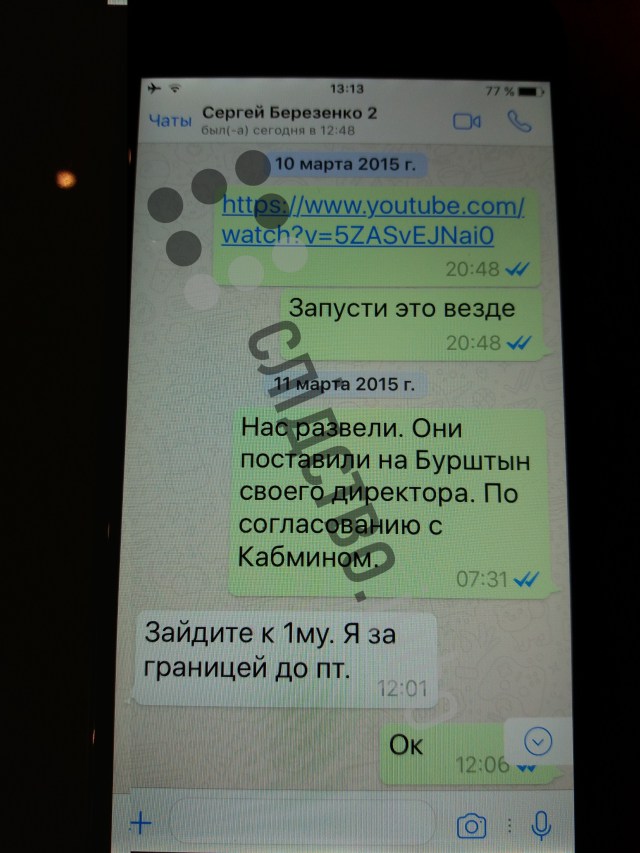
Poroshenko Bloc lawmaker Serhiy Berezenko and fugitive lawmaker Oleksander Onyshchenko discuss amber production schemes.
Channel 112
The Whatsapp messages also document Onyshchenko’s alleged attempts to buy Channel 112 from Serhiy Kurchenko, an associate of ex-President Viktor Yanukovych, on behalf of Poroshenko. Onyshchenko said Poroshenko had tried to buy the channel to eliminate its critical coverage of his administration.
“(Poroshenko) is OK with $16 million,” Onyshchenko told Berezenko on April 15, 2015. “I gotta see the president on Friday. If it suits, the deal and payment can be completed before the May holidays.”
The talks turned out to be unsuccessful because Kurchenko wanted a higher price.
“(Kurchenko) says he was desperate to get money before the May holidays because he was buying something,” Onyshchenko told Berezenko on May 28, 2015. “But he’s already bought it and he’s not desperate anymore. He doesn’t want $15 (million) now. He says $25 to $30 (million).”
In his book, Onyshchenko also published an alleged agreement between Viktor Polishchuk, an intermediary in the talks, and Channel 112’s creative producer Viktor Zubritsky according to which the criminal case against Zubritsky would be closed if the channel was sold.
The strana.ua news site has published an alleged memorandum between Onyshchenko and Channel 112’s nominal owner Andriy Podshchypkov under which the channel would abstain from criticizing Poroshenko and Onyshchenko would have a preemptive right to buy it for at least $30 million. The memorandum’s authenticity was confirmed by Podshchypkov.
In the Whatsapp correspondence, Onyshchenko mentions that BL (an apparent reference to Poroshenko’s ex-Chief of Staff Boris Lozhkin) and Grigory Shverk, who was a vice president of media group UMH when it was owned by Lozhkin, took part in negotiations to buy Channel 112.
According to a TSN television show investigation, a relative of Shverk acquired Our Radio, one of UMH’s assets, from Kurchenko in 2014 allegedly on behalf of Lozhkin.
Lozhkin sold UMH for $500 million to Kurchenko in 2013. Lozhkin, who denies the accusations, has been investigated in a money laundering case in Austria over the deal and has been accused of accepting money stolen by Kurchenko for UMH.
Zlochevsky’s assets
Onyshchenko told the Kyiv Post that Poroshenko had extorted a $80 million payment from ex-Ecology Minister Mykola Zlochevsky for closing criminal cases against him, which Burisma denies. The cases against Zlochevsky were closed in 2017, and he currently owns the biggest number of oil and gas licenses in Ukraine.
In April Onyshchenko published an alleged audio recording of a conversation between Poroshenko and Zlochevsky on a corrupt deal involving Burisma group.
Burisma group has supplied natural gas to firms owned by Poroshenko and his top allies Kononenko and Oleh Gladkovsky, Radio Liberty’s Schemes investigative show reported in 2017. Onyshchenko claimed that the gas had been supplied free of charge as payment for immunity from prosecution.
Akhmetov’s assets
In his book, Onyshchenko claimed that Poroshenko privatized the assets of Naftogazvydobuvannya, which belonged to the state, in 1997 as part of a shady scheme in exchange for a bribe to then Prime Minister Valery Pustovoitenko.
However, businesspeople Nestor Shufrich and Mykola Rudkovsky falsified documents to seize Naftogazvydobuvannya’s assets from Poroshenko in the early 2000s, Onyshchenko added. They deny the accusations.
But Poroshenko never abandoned plans to return Naftogazvydobuvannya, according to Onyshchenko. In 2012 Shufrich and Rudkovsky sold Naftogazvydobuvannya to Akhmetov.
Onyshchenko said that in 2014 Poroshenko had asked him to help him return Naftogazvydobuvannya and get money from Burisma by revoking their licenses and opening criminal cases against them. Onyshchenko has claimed that Poroshenko had extorted $180 million from Akhmetov for unfreezing the assets of his oil and gas firm Naftogazvydobuvannya, which is denied by Akhmetov.
People’s Front
Onyshchenko also claimed in his book that the People’s Front party’s 2014 parliamentary campaign had been financed from corrupt revenues. The People’s Front leader, ex-Prime Minister Arseniy Yatsenyuk, has denied the accusations.
Karpartygaz, a firm that has concluded a deal with Ukrgazvydobuvannya, produces about 1 billion cubic meters per year. Of that amount, the company was supposed to sell 200 million cubic meters to households at a reduced price, Onyshchenko wrote. Instead, this amount was sold at much higher prices to businesses, and the revenue, worth $40 million, was used to finance the People’s Front’s election campaign in 2014, he claimed.
Discrediting campaign
Onyshchenko also regularly sends to Poroshenko allies reports on how he’s trying to discredit Yatsenyuk and Radical Party leader Oleh Lyashko.
“I’m entering the battle with Lyashko,” Onyshchenko told Kononenko. “I’ll kick his ass.”
Kononenko approved, replying “super.”
Onyshchenko has said he had been asked by Kononenko to orchestrate a smear campaign against Yatsenyuk to force him to resign. The campaign, which included anti-Yatsenyuk protests and bribing media to attack the then prime minister, cost $3 million per month and ran for 10 months, he told the Independent.
